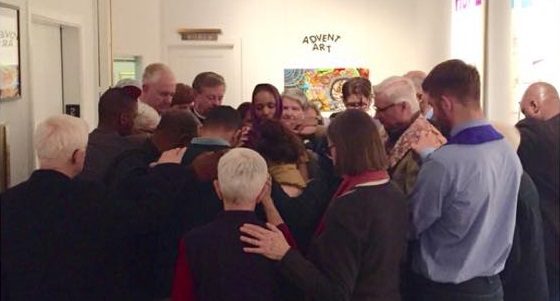
By Susan Campbell
Too often, the public face of evangelical Christianity is that of a shouting preacher sweating into the microphone so much that he’s (it’s always a he) shorting out the lights in his fervor to send you, and you, and YOU to hell.
To the administrators of Wheaton College: Baby Jesus is crying. And the lights are flickering.
In a show of solidarity with her Muslim brothers and sisters, Wheaton College political science associate professor Larycia Hawkins recently chose to wear a hijab. By way of explanation, Prof. Hawkins posted on Facebook earlier this month: “I stand in religious solidarity with Muslims because they, like me, a Christian, are people of the book. And as Pope Francis stated last week, we worship the same God.”
Compare that loving rhetoric to what passes for theological discussions in the public sphere these days, where a leading presidential candidate seeks to ban Muslims from entering the country, and threats and violence against Muslims in this country have increased exponentially in the last few weeks.
In the middle of the fire, here was a Christian woman taking a much-needed stand. She also called on her Christian sisters to do the same, because as she wrote, “theoretical solidarity is not solidarity at all.”
On Dec. 15, Wheaton College placed Prof. Hawkins on paid administrative leave while administrators review the matter. Evidently, the hijab was not a problem, but suggesting that Christians and Muslims worship the same God runs counter to the school’s Statement of Faith and Educational Purpose, written in 1924, just one year before the Scopes Trial. In a statement, the college said:
“While Islam and Christianity are both monotheistic, we believe there are fundamental differences between the two faiths, including what they teach about God’s revelation to humanity, the nature of God, the path to salvation and the life of prayer.”
Hawkins is a tenured professor, an African American, and from all indications, she’s a popular professor whose leave has been the subject of much discussion on campus.
Every group needs quality control, and every group has rules by which it dictates who is in, and who is outside the group. I get that. The problem with Wheaton’s public stance is that it reaffirms evangelicals’ reputation as being a people so blinded by the don’ts of the Bible, they can’t see the do’s.
Then, too, quality control is challenging in a world of evangelical Christian schools that includes one college (Liberty, I’m talking to you) where administrators encourage students to carry weapons to “end those Muslims.”
I come to this conversation as an evangelical fundamentalist, buried in baptism to walk with Jesus at the Fourth and Forest church of Christ in Joplin, Mo. I can talk about the Trinity until Jesus returns. I’m fascinated at the diversity of beliefs even among those who warm evangelical pews.
But to interrupt this teacher’s career strikes me as so much sweating into the microphone. During a time of great strife when Muslim brothers and sisters bear the brunt of misplaced anger and pain, what is more godly – or more in keeping with Jesus’ example – than reaching out? Shouldn’t that act of solidarity mean more than any notion about the Trinity or whose god is bigger? Are we as evangelicals so fearful and defensive about our faith that we see threats everywhere? How big is our God, anyway?
Didn’t Jesus model reaching out to people who were downtrodden multiple times? And didn’t he warn early Christians against focusing on the letter of the law. (That’s II Cor. 3:6, if you’re following along.)
Are we to do any less?
Sadly, what so often distinguishes people of my tribe is our smallness of spirit, our insistence on clinging to the letter of the law and ignoring the spirit of the thing. If we take our Bible straight then our law is love (I Cor. 13). Prof. Hawkins was fulfilling Gal. 6:2 by bearing someone’s burden – and even more importantly, she is bearing the burden for people she doesn’t even know. She doesn’t deserve an administrative leave. She deserves a promotion.
In part to handle the outcry, Wheaton college president, Dr. Phillip Ryken, just issued a statement reaffirming that the college supports the rights of all Americans to worship as they choose.
Somehow, that comes up short. Prof. Hawkins is talking about love. And Dr. Ryken? He is seeking to reassure everyone that Wheaton is just fine with Muslims, though our God is bigger.
The school’s statement purports to reaffirm “salient features of the historic Christian creeds, thereby identifying the College not only with the Scriptures but also with the reformers and the evangelical movement of recent years.” Reform is very much a part of Wheaton’s past, including early and lusty support of the abolition movement, when abolitionism was not considered a suitable topic of conversation among polite company. Reformers in recent years have reached out to our Muslim brothers and sisters, as well as our Jewish and Bahai and Sikh ones.
The school’s statement also expresses the hope that Jesus return to earth soon. Should that happen, I look forward to the school’s explanation for this. Sorry, Jesus? We were protecting the brand?
In response to all of this, Prof. Hawkins posted something else on her Facebook page. She wrote: To those who question the authenticity of my faith, I love you.” There it is again, that word. Love.
Susan Campbell is distinguished lecturer at University of New Haven, and author of “Dating Jesus: Fundamentalism, Feminism, and the American Girl,” and “Tempest Tossed: The Spirit of Isabella Beecher Hooker.”











